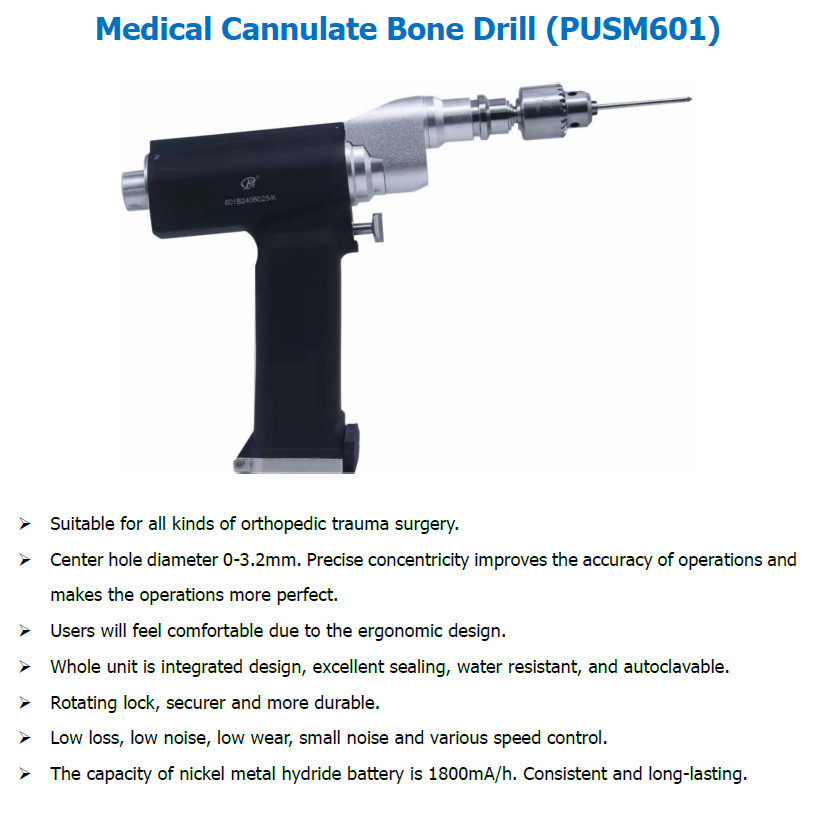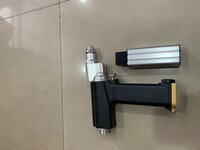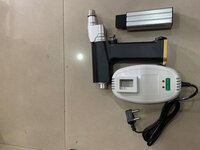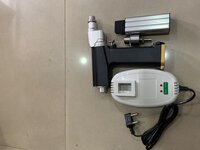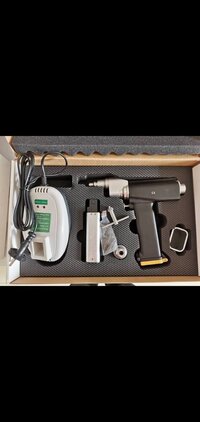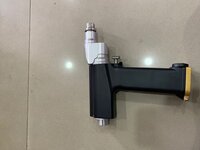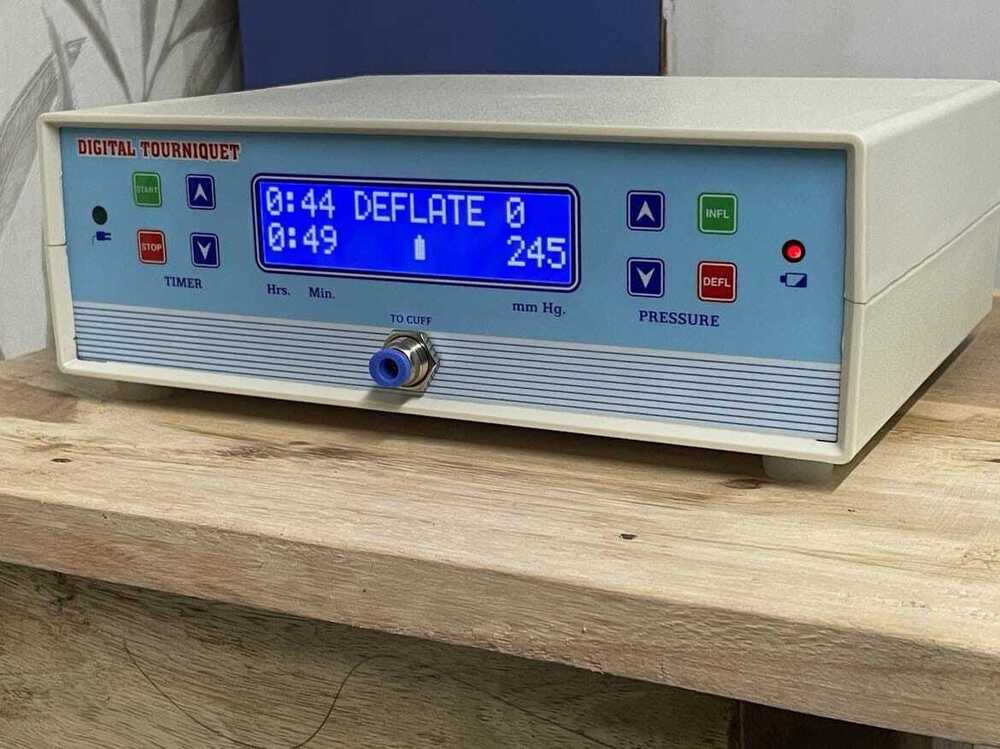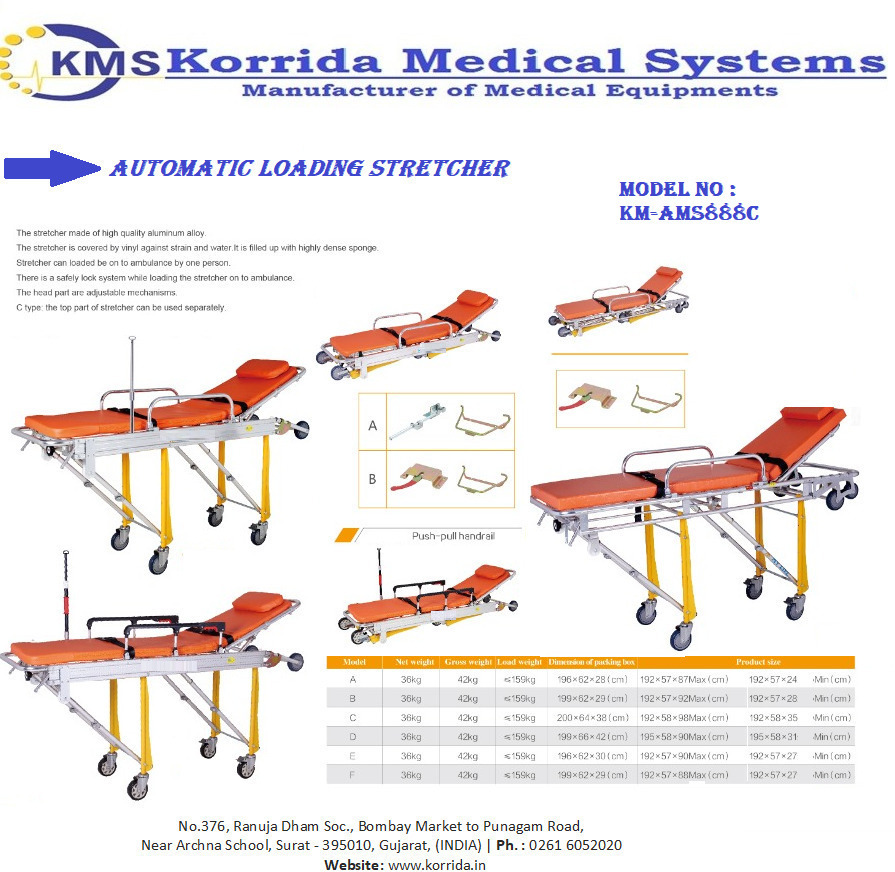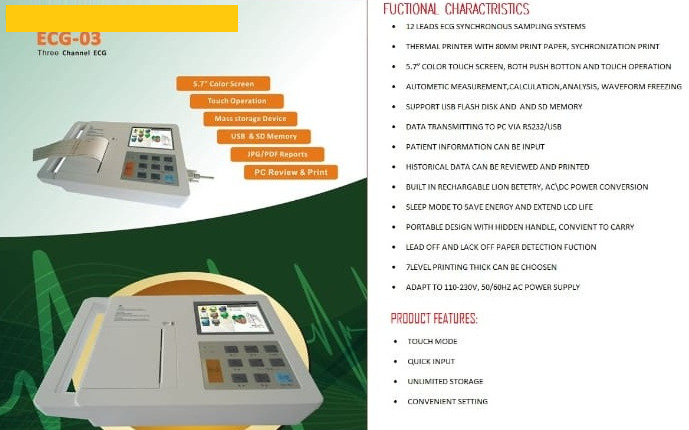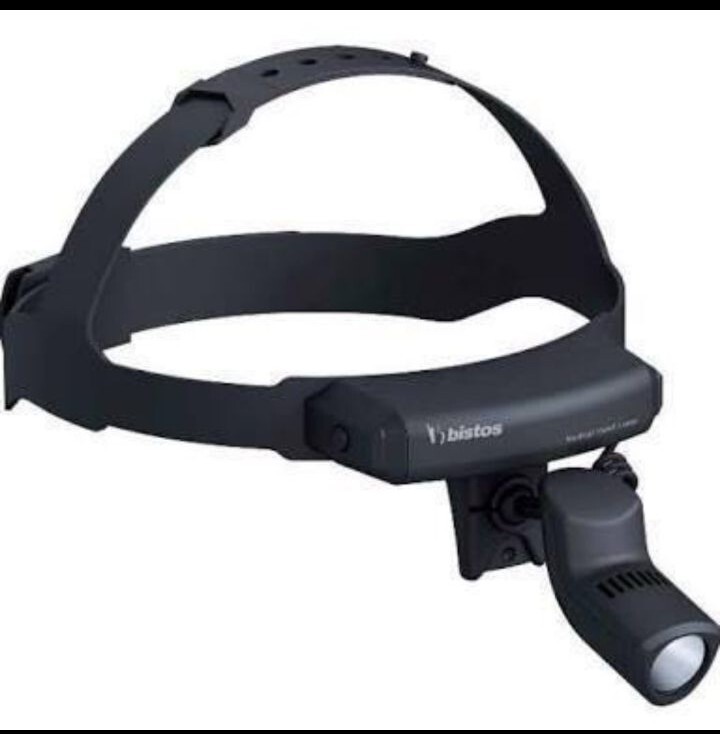ORTHO DRIL
Product Details:
- Dimension (L*W*H) 35*35*35 Inch (in)
- Material IRON
- Use HOSPITAL USE
- Weight 10 Kilograms (kg)
- Suitable For HOSPITAL
- Power 500 Volt (v)
- Color Code BLACK
- Click to View more
ORTHO DRIL Price And Quantity
- 1 Piece
ORTHO DRIL Product Specifications
- BLACK
- 500 Volt (v)
- 10 Kilograms (kg)
- HOSPITAL
- 35*35*35 Inch (in)
- HOSPITAL USE
- IRON
- MEDICAL
ORTHO DRIL Trade Information
- Cash in Advance (CID)
- 50 Piece Per Day
- 7 Days
- Asia Australia Central America North America South America Eastern Europe Western Europe Middle East Africa
- All India South India Central India West India North India East India Gujarat Karnataka Kerala Lakshadweep Mizoram Meghalaya Manipur Andhra Pradesh Bihar Chandigarh Daman and Diu Goa Jharkhand Odisha Punjab Assam Delhi Dadra and Nagar Haveli Andaman and Nicobar Islands Arunachal Pradesh Chhattisgarh Haryana Himachal Pradesh Jammu and Kashmir Madhya Pradesh Maharashtra Nagaland Rajasthan Sikkim Tamil Nadu Telangana Tripura Pondicherry Uttar Pradesh Uttarakhand West Bengal
Product Description
A Blood Warmer is a medical device designed to safely heat blood IV fluids or other solutions to a temperature close to body temperature 37C before infusion into a patient It is widely used in surgery trauma care ICU and emergency settings to prevent hypothermia caused by administering cold fluids or blood transfusions
Key Features of Blood Warmer
Precise Temperature Control
Maintains fluid temperature between 35C and 42C to ensure safe infusion
Digital temperature monitoring prevents overheating and thermal injury
Rapid Heating Technology
Provides quick warming to handle emergency transfusions or highflow infusions
Preheats within seconds to handle large volumes efficiently
Multiple Heating Modes
Supports IV fluids plasma blood and crystalloid solutions for versatile applications
Compatible with continuous flow systems for mass transfusion protocols
Portability and Compact Design
Lightweight and portable for use in ambulances field hospitals and disaster relief operations
Models with battery backups ensure uninterrupted function during transport
Compatibility with Standard IV Lines and Tubing
Works with standard infusion sets making it easy to integrate into existing setups
Some models include disposable warming sleeves or inline heaters for infection control
Overheat Protection and Safety Alarms
Builtin alarms for temperature deviations flow blockages or device malfunction
Auto shutoff feature ensures safety during extended use
Continuous Flow Warming
Allows highflow infusion rates of up to 500 mLmin suitable for trauma situations requiring largevolume resuscitation
UserFriendly Interface
Touchscreen or LED display for temperature adjustments and status monitoring
Preset temperature settings simplify operation during emergencies
Applications of Blood Warmer
Emergency and Trauma Care
Rapidly warms blood and IV fluids for shock resuscitation and hypovolemic patients
Used in ambulances and field operations for prehospital care
Surgical Procedures
Prevents hypothermia during major surgeries requiring continuous transfusions or fluid replacement
ICU and Critical Care Units
Ensures normothermia in patients requiring longterm IV therapy
Suitable for burn patients and sepsis management where temperature regulation is critical
Dialysis and Chemotherapy Centers
Provides warmed fluids for dialysis and chemotherapy infusion therapy improving patient comfort
Neonatal and Pediatric Care
Warms nutritional fluids and blood products for infants and pediatric patients with sensitive temperature needs
Advantages of Blood Warmers
Prevents Hypothermia Reduces the risk of coldinduced complications such as coagulopathy cardiac arrhythmias and shock
Fast and Accurate Heating Ensures immediate response in emergency situations without waiting for manual warming methods
Versatility in Fluid Types Suitable for blood IV fluids medications and plasma solutions
Portable and BatteryOperated Models Ensures flexibility in ambulatory and field settings
Ease of Use Preconfigured temperature settings simplify operation for both trained and emergency personnel
Infection Control Features Disposable components ensure hygienic fluid warming and reduce crosscontamination risks
Advanced Features in Modern Blood Warmers
Microprocessor Control Systems
Monitors and adjusts temperature in real time for consistent performance
Smart Alarms and Alerts
Detects air bubbles blockages or temperature fluctuations and provides instant warnings
Integrated Battery Systems
Enables use during transport and outdoor scenarios especially in ambulances or disaster response areas
HighFlow Capability
Handles largevolume infusions required during massive transfusion protocols MTPs
Disposable Cassette Systems
Allows singleuse cassettes for faster setup and hygiene assurance
USB and Bluetooth Connectivity
Tracks temperature logs for compliance and data analysis
Limitations of Blood Warmers
Limited Flow Rate for Massive Transfusions May require dedicated highflow warmers for trauma resuscitation
SingleUse Components Increase Cost Disposable tubing and warming sleeves may require frequent replacement
Battery Runtime Constraints Portable models may have short runtime 24 hours and require backup systems
Compatibility Issues Not all devices work with nonstandard IV lines or proprietary systems
Operator Dependency Requires trained personnel to monitor temperature settings and performance alarms
Optional Accessories
Disposable Warming Sets Ensure hygienic warming and reduce crosscontamination
Transport Bags Protect the device during emergency response operations
Battery Extensions Extend the operational life in remote environments
Mounting Brackets Enable fixed placement on ambulances or ICU walls
Flow Rate Adaptors Allow compatibility with highflow transfusion setups
Key Specifications Example for Modern Models
ParameterSpecification
Heating Range3542C
WarmUp Time3060 seconds
Flow Rate2500 mLmin
Power SourceACDC Rechargeable Battery 24 hrs
DisplayDigital touchscreen with status alerts
Weight153 kg Portable Models
Safety FeaturesOverheat alarms auto shutoff leak detection
Would you like more information on specific models technical comparisons or pricing options
You said
BONEDRILL CONCEPT
ChatGPT said
ChatGPT
Bone Drill Concept
A Bone Drill is a surgical power tool used in orthopedic trauma and neurosurgical procedures for drilling holes into bone structures to fix implants screws or plates It is designed for precision stability and ease of use ensuring minimized damage to surrounding tissues and optimal surgical outcomes
Key Features of Bone Drill
HighSpeed Drilling Mechanism
Operates at variable speeds eg 01200 RPM to ensure precision and efficiency
Torque control prevents overpenetration and protects soft tissues
Versatile Drill Bits and Attachments
Compatible with multiple drill bits for different procedures including reaming drilling and screw insertion
Quickchange mechanism for fast setup
Ergonomic Design
Lightweight and balanced structure to reduce surgeon fatigue during long surgeries
Nonslip grip for firm handling in sterile environments
Corded and Cordless Options
Cordless models operate with rechargeable lithiumion batteries for freedom of movement
Corded options provide continuous power supply for extended surgeries
Sterilizable Components
Constructed with autoclavable materials eg stainless steel and aluminum alloys to ensure infection control
Adjustable Speed and Torque Settings
Allows customization for bone density and specific drilling applications
Reverse rotation mode for screw removal and drill bit adjustments
Precision and Safety Features
Depth gauge systems prevent overdrilling into sensitive areas like nerves or blood vessels
Cooling systems reduce heat buildup minimizing bone damage
Wireless and BatteryPowered Options
Batterypowered designs offer 26 hours of runtime for field surgeries or disaster relief operations
Applications of Bone Drill
Orthopedic Surgery
Used in fracture fixation joint reconstruction and implant placement eg hip knee or shoulder surgeries
Trauma and Emergency Surgery
Critical for fracture stabilization and external fixation procedures in emergency settings
Neurosurgery
Facilitates cranial drilling during craniotomies and neurovascular interventions
Spinal Surgery
Assists in vertebral fixation screw placement and disc surgeries
Dental and Maxillofacial Surgery
Used for implant drilling jaw reconstruction and orthodontic anchor placements
Veterinary Surgery
Useful in orthopedic repairs for animals including bone pinning and fracture stabilization
Advantages of Bone Drill
High Precision Drilling Ensures accurate placement of screws and implants
Lightweight and Portable Suitable for field operations disaster relief and ambulatory surgeries
Fast Setup and Cleaning Autoclavable parts enable quick sterilization and reuse
Battery Operated Models Provide mobility in remote environments without power constraints
Adaptability for Multiple Procedures Compatible with drills taps reamers and cutting tools
Low Noise and Vibration Levels Reduces discomfort for patients and surgeons
Advanced Features in Modern Bone Drills
MicroprocessorControlled Systems
Provides realtime feedback and precise torque adjustments
Smart Battery Management
Displays remaining battery life and alerts for low power
Variable Speed Control
Adjustable speed ranges from 1001200 RPM for different bone densities
Depth Limit Sensors
Ensures controlled drilling to avoid damage to soft tissues
Compatibility with Robotics
Integrates with robotassisted surgical systems for minimally invasive procedures
Limitations of Bone Drills
Battery Runtime Constraints Cordless models may require frequent recharging for long surgeries
Complex Maintenance Needs Requires regular cleaning calibration and lubrication
Learning Curve for Specialized Features Advanced settings may require training for optimal use
Cost Variations Highend models with robotic compatibility and data tracking features may be costprohibitive for small clinics
Optional Accessories for Bone Drills
Drill Bits and Burr Sets For specific surgical procedures and bone densities
Battery Packs and Chargers Extend runtime in remote surgeries
Depth Gauges and Guides Ensure precise drilling depth for implant placement
Sterile Covers and Sleeves Maintain hygiene during procedures
Mounting Attachments For integration with robotic surgical systems
Specifications Example Model
ParameterSpecification
Speed Range01200 RPM
Torque ControlAdjustable 055 Nm
Battery Life26 hours Cordless models
Weight153 kg Ergonomic designs
MaterialStainless Steel Titanium Alloy
Sterilization MethodAutoclavecompatible components
Safety FeaturesDepth gauges torque monitoring alarms
Would you like comparisons with other surgical tools specific models or pricing details

Price:
- 50
- 100
- 200
- 250
- 500
- 1000+
Other Products in 'KORRIDA MEDICAL SYSTEM' category
 |
KORRIDA MEDICAL SYSTEMS
All Rights Reserved.(Terms of Use) Developed and Managed by Infocom Network Private Limited. |

 Send Inquiry
Send Inquiry